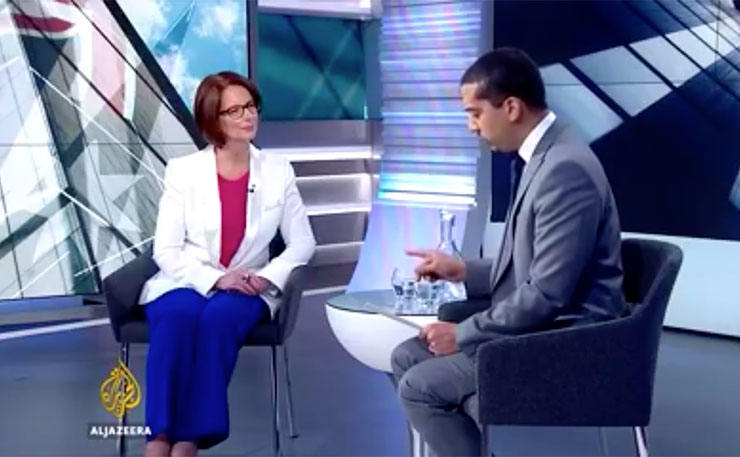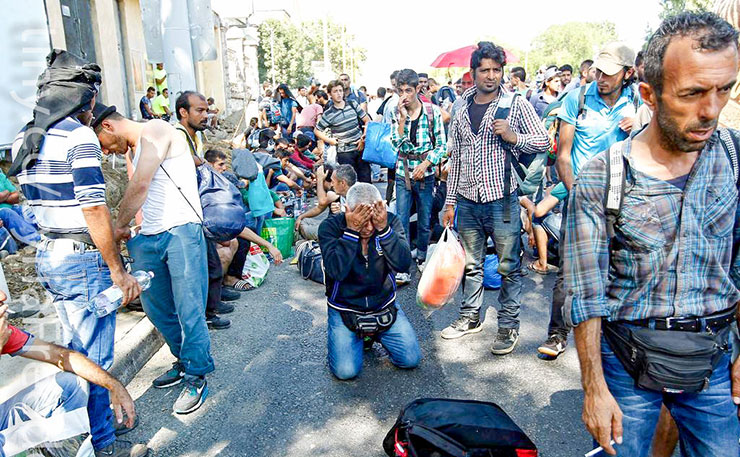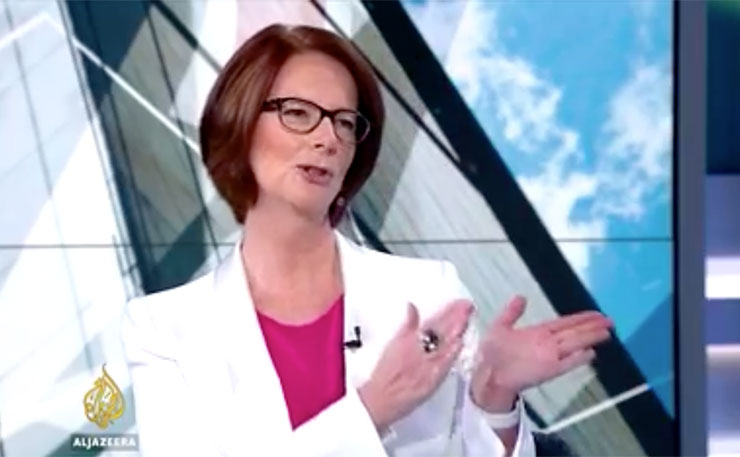This is the Julia Gillard interview that all fans of Julia Gillard should watch. Chris Graham reports.
Watching the former Australian Prime Minister try to explain away her “toxic and inhumane” policies towards refugees is something to behold.
Tony Abbott’s first appearance on the world speaker’s circuit – when he tried to explain why Europe should ‘turn back the boats’ – rightly drew howls of derision from Australia, and most corners of the world.
But his predecessor, Julia Gillard appears to be having a much easier run of things, despite the fact her policies targeting asylum seekers were almost identical.
On Saturday morning, Gillard appeared on Al Jazeera’s Up Front program to promote her role as the new Chair of the Global Partnership for Education, an NGO which promotes the importance of education to children.
But award-winning journalist Mehdi Hasan was more interested in Gillard’s record as Prime Minister, and specifically what she did to some of the world’s most vulnerable children while she ruled a wealthy nation.
In particular, Hasan pushed Gillard to respond to claims from Amnesty International and the UN Committee for Human Rights that Australia, under Gillard’s watch, detained asylum seekers in “toxic and inhumane conditions” on Manus Island and Nauru.

The interview began with a classic Gillard motherhood statement: “Well frankly, I think the world and the wealthiest parts of the world have got a great responsibility here.”
That was in reply to a question about whether or not Australia should do more to help the global refugee crisis. Which is as ‘non-answer’ as an answer gets. So Hasan had another crack, asking Gillard what percentage of the world’s refugee population Australia takes. She didn’t know, but knew it was “very generous.”
“I don’t know what proportion, but I do know by the standards of the United Nations High Commissioner of Refugees we’ve been a very generous re-settler of refugees. We’ve always operated a very sizeable program.”
Hasan replied: “Your country in 2014 received just 0.43 per cent of the world’s asylum claims.”
Gillard later asserted that Hasan was unfairly “taking a snapshot of history.”
Indeed he was taking a snapshot of history… a snapshot of Gillard’s history as Prime Minister, when the numbers of children held in “toxic and inhuman conditions” on Manus Island and Nauru peaked under her government at almost 2,000.
The fiddle, as with all things Gillard is in the language. Australia does take a proportionally ‘generous’ number of refugees from the UN re-settling program, which only managed to resettle around 73,000 refugees in 2014.
At the same time, more than 13 million refugees sought asylum via the UN in mid-2014, many of them from conflicts Australia sponsored.
That’s the so-called ‘queue’ made famous by John Howard’s queue-jumper rhetoric. A ‘queue’ that will take, on average, 178 years to reach the front of.

Gillard studiously avoided commenting on the actual facilities on Manus and Nauru. Save for this: “We had a variety of models of what detention was. Many of the facilities were quite different… suitable for families, and kids were in school, kids were in school. And in terms of what I do now, my prime mission is to make sure kids are in school.”
“Suitable for families”, presumably, who are okay with rape, sexual assault, indefinite detention and living in tents behind wire.
Gillard also played the ‘woe is me’ card.
“You don’t know what it’s like as Prime Minister to get the telephone from your defence forces to tell you that they suspect that an asylum seeker boat has gone down, and they’re engaging in desperate measures to try and rescue people from the water, but whatever they do people die. So that is the underpinning of the policy,” she said.
I imagine the men, women and children still locked up on Manus and Nauru three years later can feel Gillard’s pain.
You can watch the full interview here. And comment and share below.
* Please consider subscribing to New Matilda here. We’re a small, independent media outlet and we rely almost entirely on reader subscriptions for our survival. They start from as little as $6 a month – less than two cups of coffee.
Donate To New Matilda
New Matilda is a small, independent media outlet. We survive through reader contributions, and never losing a lawsuit. If you got something from this article, giving something back helps us to continue speaking truth to power. Every little bit counts.






